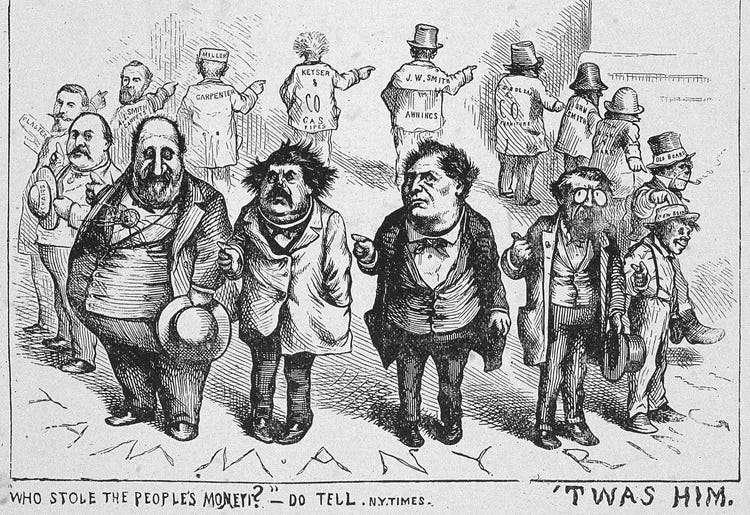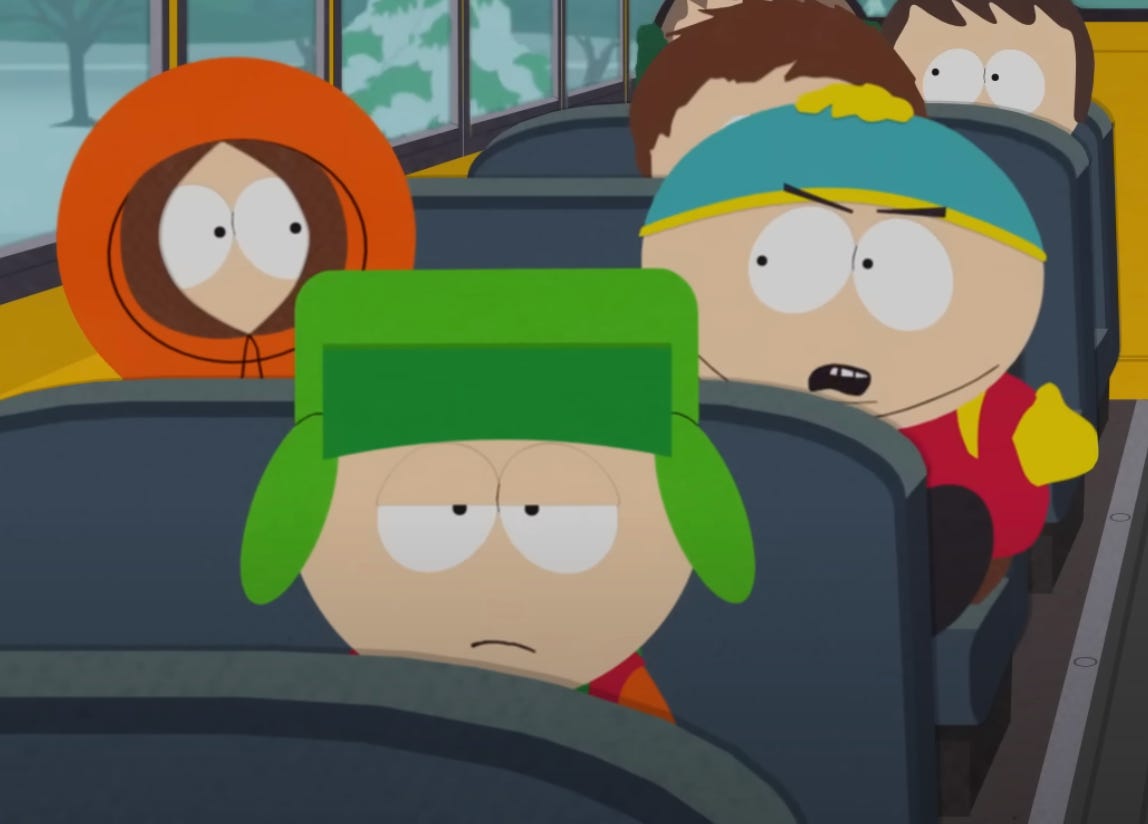My ‘Coddling’ article turns 10, Trump gets the South Park treatment, RIP Tom Lehrer, & more!
Bringing you the latest free speech news (8/3/25)
Story of the week
This month, the original “Coddling” article—co-authored by Jonathan Haidt & me, originally published by The Atlantic in 2015, and which would eventually become Jon’s and my NYT bestseller in 2018—turns 10!
I’m considering writing a follow-up on the lessons that we, as a society, have and haven’t learned since its publication. Our major predictions were that the new mentality that preoccupied students entering school around 2013-2014 would not only be a major problem for free speech and academic freedom, but that the students themselves would suffer terrible mental health consequences. Unfortunately we were proven correct on both counts, only to a much larger degree than Jon and I predicted.
While I am of course pleased that the article and subsequent book reached as many people as it did, I am disappointed that the most fundamental point—that kids need more independence and that we should stop teaching them the mental habits of anxious and depressed people—hasn't been more influential.
But, as I consider working on a piece, I would love to hear your thoughts on “Coddling” 10 years later, so please leave a comment!
This week in ERI
NOTE: This one ruffled some feathers. See my response to some of the most common criticisms we heard.
This week in Expression
Lehrer’s legacy reminds us that censorship isn’t just imposed from above. It can also be enforced from below — through silence, shame, or the threat of social and professional ruin. But the antidote, then as now, is clear: Speak honestly. Laugh loudly. Share freely. Or as Lehrer himself wrote in the liner notes to the 1997 compilation “Songs & More Songs by Tom Lehrer”:
“If, after hearing my songs, just one human being is inspired to say something nasty to a friend or, perhaps to strike a loved one, it will all have been worth the while.”
Will free expression make a comeback at Haverford College? by William Harris
This week in FIRE’s blog
Inside the Trump administration’s extortion-industrial complex by Tyler Tone
In Philly, a new generation finds its voice — and the tools to defend it by Katie Ratke
This year’s cohort returns with more than just a handful of business cards. They walk away with a newfound mission to return to campus and begin work reviving the culture of civil discourse in this nation. Philadelphia may have been where free speech first became law, but for these students, it’s where their fight for it began.
FIRE in the press!
South Park's Trump Takedown Joins a Proud American Tradition (Reason) by Bob Corn-Revere
This kind of satire has long been a potent antidote to political corruption in America, perhaps best illustrated by the downfall of Tammany Hall, a corrupt Democratic machine that dominated New York City after the Civil War. It was run by the notorious William "Boss" Tweed, whose openly corrupt organization, "The Ring," collected millions of dollars in illegal graft. Newspapers had covered the scandal, but the public really took notice because of the work of Thomas Nast, the political cartoonist for Harper's Weekly.

Don’t Resort to Censorship to Fight Populism (Persuasion) by Jacob Mchangama
Columbia’s $200 million deal undermines free speech (UnHerd) by Will Creeley
London Calling: Ronnie’s First Amendment Roundup
Second Circuit credulously entertains NY claims that its Online Hate Speech Law doesn’t require social media to do much of anything, certifies questions to state high court to interpret the law, putting off federal appellate ruling on constitutionality
Eyebrow-raising circuit court decision-making remains a theme, as this week FIRE received a “decision” in its challenge on behalf of law prof/blogger Eugene Volokh and platforms Rumble and Locals to New York’s “Hateful Conduct Law,” in which the Second Circuit declines to either affirm or reverse the preliminary injunction against its enforcement, but instead certifies questions about its interpretation to New York’s highest state court. The law, which targets online hate speech, requires social media networks (broadly defined) to have an “easily accessible mechanism … to report incidents of hateful conduct” on the platform and a “policy readily available and accessible” that says how the platform “will respond and address the reports,” all based on “hateful conduct” defined as “use of a social media network to vilify, humiliate, or incite violence against a group or a class” based on protected characteristics,” all backed by AG enforcement and civil penalties. Volokh, Rumble and Locals challenged the law as unconstitutionally forcing upon them a definition of “hateful conduct” that is unduly malleable, vague, and overbroad, and as overriding an operator’s plan for its platform by requiring a policy and potentially burdensome reporting mechanism specific to the state’s definition. The trial court held the statute is content-based and incapable of satisfying strict scrutiny, as well as unconstitutionally overbroad and vague, and thus preliminarily enjoined enforcement as likely violative of the First Amendment. And on appeal, the Second Circuit agreed that if the law operates as described in the constitutional challenge based its “most natural reading,” it’s unconstitutional, even under less stringent intermediate scrutiny. But the majority of the 2-1 split panel was also open to what the dissent called arguments by “the state's backpedaling lawyers” that the law merely requires “neutral disclosure that does not incorporate or affirmatively encompass the State’s definition of ‘hateful conduct’” in social media policies and reporting mechanisms, which would render those requirements constitutionally permissible compelled commercial disclosures. So, rather than deciding whether the preliminary injunction properly issued, the majority certified questions about how to interpret the statute—which no state court has ever construed—to the New York Court of Appeals to answer in the first instance. The dissent opined that the law is unconstitutional no matter what—rendering unanimous the panel’s view that its most obvious reading violates the First Amendment—and that even under the state’s watered-down reading, the law threatens social media with “punishing fines if they fail to police content in precise accordance” with the required policy and “grants the state enforcement discretion over whether [] content moderation decisions live up to those policies.” You can find FIRE’s case page for the challenge, with all its commentary and court filings, here.
International free speech stories of the week
Free Speech Sees Rare Win in Iran (Newsweek) by Amir Daftari
Hong Kong democracy campaigner accuses UK police of asking her to ‘self-censor’ (The Guardian) by Henry Belot & Geneva Abdul
A former Hong Kong politician and prominent democracy campaigner has accused British police of asking her to “self-censor” and “retreat from public life” after officers asked her to agree to avoid public gatherings.
The request, outlined in a signed “memorandum of understanding” seen by the Guardian, has alarmed exiled dissidents who fear it may embolden attempts to silence criticism of Chinese and Hong Kong officials worldwide.
The UK is slogging through an online age-gate apocalypse (The Verge) by Jess Weatherbed
Russia sees push for return of official censorship (Le Monde) by Marie Jégo
Movie of the week
I have read every single panel of every single issue of the Fantastic Four's first 400+ issue run. I’m a HUGE fan of Jack Kirby and John Byrne, and the new movie was kind of a love poem to everything that made the first hundred issues of Fantastic Four with Stan Lee and Kirby — along with Byrne's entire run in the 1980s — so magical. It was nice to see a team who genuinely loved and understood the Fantastic Four finally take the reins for a movie. It got all the big things right. The Fantastic Four as a family. The Fantastic Four as a cosmic epic. The superhero team that changed the world both inside and outside the comic book. And I loved the retro-futurism so wonderfully capturing Jack Kirby's visual imagination.
I will provide no spoilers, just a hearty endorsement!








Congrats on the 10th birthday of the article that started it all!
I watched the documentary adaptation of The Coddling, and it helped me find peace with a lot of what happened to me during high school. I've since become actively involved in its Substack community. It's both reassuring and heartbreaking to know I'm not the only one who has been through what I've been through.
Thank you for the work that you do. I wish I knew how to share it with more of my generation. I'm so glad you're fighting to get the word out there.
I LOVED the "Coddling" book!! I shared it with as many people as would listen (which, in my case, isn't many!) I also wish that it had been more influential. I have a really hard time watching what is happening with our youth. I would be very interested in reading your thoughts re the lessons, impact (or lack of) etc. I'm also interested in how you think the book parallels other cultural phenomena in the last decade, particularly the emphasis on feelings vs logic.